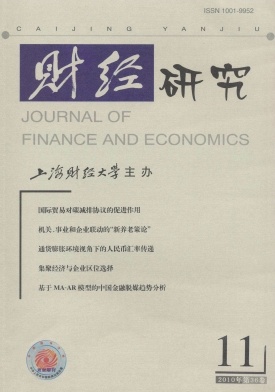财政分权是否影响了公共教育供给——基于理论模型与地级面板数据的研究
财经研究 2010 年 第 36 卷第 11 期, 页码:40 - 51
摘要
参考文献
摘要
1994年分税制改革在提升了中央财权的同时,却使地方政府事权负担加重。这种支出的财政分权可能使地方政府减少公共服务的供给,比如公共教育供给。文章首先分析了产生该现象的主要原因,然后构建理论模型,基于1996-2007年全国地级面板数据进行实证研究,结果证明财政分权确实减少了公共教育供给。文章进一步做了不同教育阶段和不同地区的对比。依据分析结果,文章对改进公共教育供给提出了财政体制方面的政策建议。
[1]丁菊红,邓可斌.政府偏好、公共品供给与转型中的财政分权[J].经济研究,2008,(7):78-89.
[2]黄佩华,迪帕克.中国:国家发展与地方财政[M].北京:中信出版社,2003.
[3]罗伟卿.财政分权新思想:分权体制与地方公共服务[J].财政研究,2010,(3):11-15.
[4]乔宝云,范坚勇,冯兴元.中国的财政分权与小学义务教育[J].中国社会科学,2005,(6):37-46.
[5]王绍光.分权的底线[M].北京:中国计划出版社,1997.
[6]殷德生.最优财政分权与经济增长[J].世界经济,2004,(11):62-71.
[7]周黎安.中国地方官员的晋升锦标赛模式研究[J].经济研究,2007,(7):36-50.
[8]Busemeyer,Marius R.The impact of fiscal decentralization on education and other typesof spending[J].Swiss Political Science Review,2008,14:451-81.
[9]Cai Hongbin,Daniel Treisman.Does competition for capital discipline governments?De-centralization,globalization,and public policy[J].The American Economic Review,2005,95:817-830.
[10]Lin Justin Z Liu.Fiscal decentralization and economic growth in China[J].EconomicDevelopment and Culture Change,2003,49:1-23.
[11]Oates,Wallace E.Toward a second-generation theory of fiscal federalism[J].Interna-tional Tax and Public Finance,2005,12:349-373.
[12]Qian Y,Barry R Weingast.Federalism as a commitment to preserving market incen-tives[J].Journal of Economic Perspectives,1997,11:183-92.
[13]Qian Y,Gerald Roland.Federalism and the soft budget constraint[J].The AmericanEconomic Review,1998,88:1143-1162.
[14]Tiebout,Charles M.A pure theory of local expenditure[J].The Journal of PoliticalEconomy,1956,64:416-424.
[15]Zhang T,H Zou.Fiscal decentralization,public spending,and economic growth in China[J].Journal of Public Economics,1998,67:221-240.
[2]黄佩华,迪帕克.中国:国家发展与地方财政[M].北京:中信出版社,2003.
[3]罗伟卿.财政分权新思想:分权体制与地方公共服务[J].财政研究,2010,(3):11-15.
[4]乔宝云,范坚勇,冯兴元.中国的财政分权与小学义务教育[J].中国社会科学,2005,(6):37-46.
[5]王绍光.分权的底线[M].北京:中国计划出版社,1997.
[6]殷德生.最优财政分权与经济增长[J].世界经济,2004,(11):62-71.
[7]周黎安.中国地方官员的晋升锦标赛模式研究[J].经济研究,2007,(7):36-50.
[8]Busemeyer,Marius R.The impact of fiscal decentralization on education and other typesof spending[J].Swiss Political Science Review,2008,14:451-81.
[9]Cai Hongbin,Daniel Treisman.Does competition for capital discipline governments?De-centralization,globalization,and public policy[J].The American Economic Review,2005,95:817-830.
[10]Lin Justin Z Liu.Fiscal decentralization and economic growth in China[J].EconomicDevelopment and Culture Change,2003,49:1-23.
[11]Oates,Wallace E.Toward a second-generation theory of fiscal federalism[J].Interna-tional Tax and Public Finance,2005,12:349-373.
[12]Qian Y,Barry R Weingast.Federalism as a commitment to preserving market incen-tives[J].Journal of Economic Perspectives,1997,11:183-92.
[13]Qian Y,Gerald Roland.Federalism and the soft budget constraint[J].The AmericanEconomic Review,1998,88:1143-1162.
[14]Tiebout,Charles M.A pure theory of local expenditure[J].The Journal of PoliticalEconomy,1956,64:416-424.
[15]Zhang T,H Zou.Fiscal decentralization,public spending,and economic growth in China[J].Journal of Public Economics,1998,67:221-240.
引用本文
罗伟卿. 财政分权是否影响了公共教育供给——基于理论模型与地级面板数据的研究[J]. 财经研究, 2010, 36(11): 40–51.
导出参考文献,格式为:





 7528
7528  5172
5172

